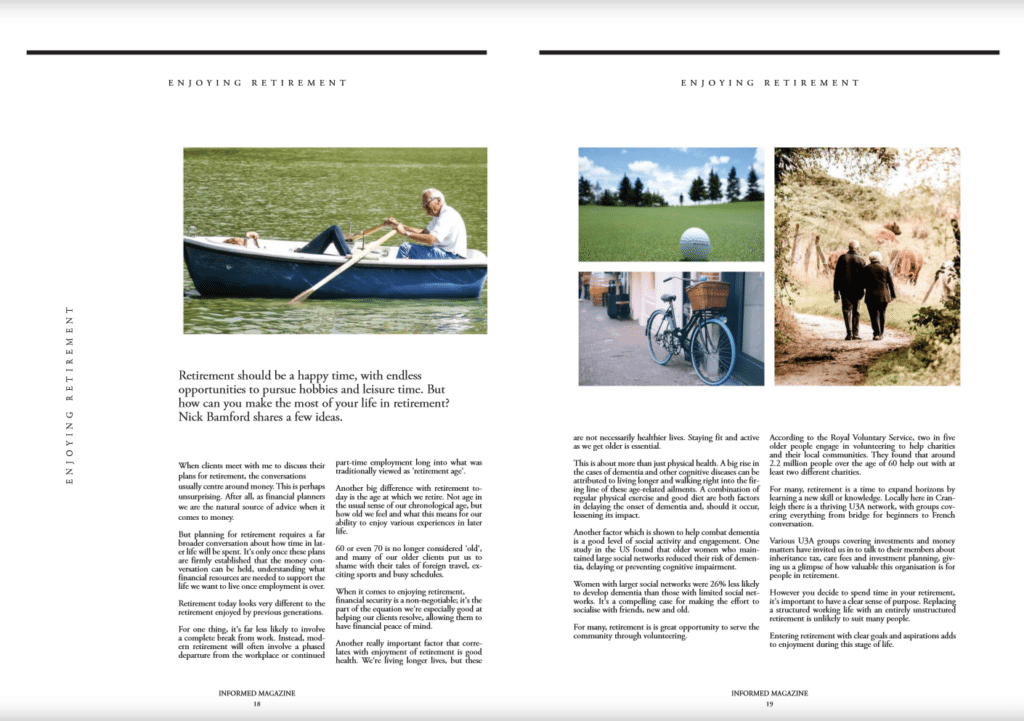When clients meet with me to discuss their plans for retirement, the conversations usually centre around money. This is perhaps unsurprising. After all, as financial planners we are the natural source of advice when it comes to money.
But planning for retirement requires a far broader conversation about how time in later life will be spent. It’s only once these plans are firmly established that the money conversation can be held, understanding what financial resources are needed to support the life we want to live once employment is over.
Retirement today looks very different to the retirement enjoyed by previous generations.
For one thing, it’s far less likely to involve a complete break from work. Instead, modern retirement will often involve a phased departure from the workplace or continued part-time employment long into what was traditionally viewed as ‘retirement age’.
Another big difference with retirement today is the age at which we retire. Not age in the usual sense of our chronological age, but how old we feel and what this means for our ability to enjoy various experiences in later life.
60 or even 70 is no longer considered ‘old’, and many of our older clients put us to shame with their tales of foreign travel, exciting sports and busy schedules.
When it comes to enjoying retirement, financial security is a non-negotiable; it’s the part of the equation we’re especially good at helping our clients resolve, allowing them to have financial peace of mind.
Another really important factor that correlates with enjoyment of retirement is good health. We’re living longer lives, but these are not necessarily healthier lives. Staying fit and active as we get older is essential.
This is about more than just physical health. A big rise in the cases of dementia and other cognitive diseases can be attributed to living longer and walking right into the firing line of these age-related ailments. A combination of regular physical exercise and good diet are both factors in delaying the onset of dementia and, should it occur, lessening its impact.
Another factor which is shown to help combat dementia is a good level of social activity and engagement. One study in the US found that older women who maintained large social networks reduced their risk of dementia, delaying or preventing cognitive impairment.
Women with larger social networks were 26% less likely to develop dementia than those with limited social networks. It’s a compelling case for making the effort to socialise with friends, new and old.
For many, retirement is is great opportunity to serve the community through volunteering.
According to the Royal Voluntary Service, two in five older people engage in volunteering to help charities and their local communities. They found that around 2.2 million people over the age of 60 help out with at least two different charities.
For many, retirement is a time to expand horizons by learning a new skill or knowledge. Locally here in Cranleigh there is a thriving U3A network, with groups covering everything from bridge for beginners to French conversation.
Various U3A groups covering investments and money matters have invited us in to talk to their members about inheritance tax, care fees and investment planning, giving us a glimpse of how valuable this organisation is for people in retirement.
However you decide to spend time in your retirement, it’s important to have a clear sense of purpose. Replacing a structured working life with an entirely unstructured retirement is unlikely to suit many people.
Entering retirement with clear goals and aspirations adds to enjoyment during this stage of life.
Four ways to enjoy retirement
Learn
Retirement is an opportunity to learn, studying for a University degree with the Open University or making new friends as you learn skills with U3A.
Exercise
Studies demonstrate the link between regular exercise and enjoyment in retirement, with physical activity also contributing to improved cognitive function in later life. By doing regular exercise, you become physically stronger and less likely to become ill or incapacitated as you get older.
Socialise
Making new friends in retirement and maintaining a large social network is increasingly important, especially in later life when loneliness is a factor of growing concern.
Volunteer
Volunteering in retirement offers a strong sense of purpose and a way to give something back to your local community. Opportunities for volunteering are endless, giving you a chance to share with others a lifetime’s worth of knowledge, skills and experience.
This article first appeared in the March 2018 edition of Informed, our client magazine.


